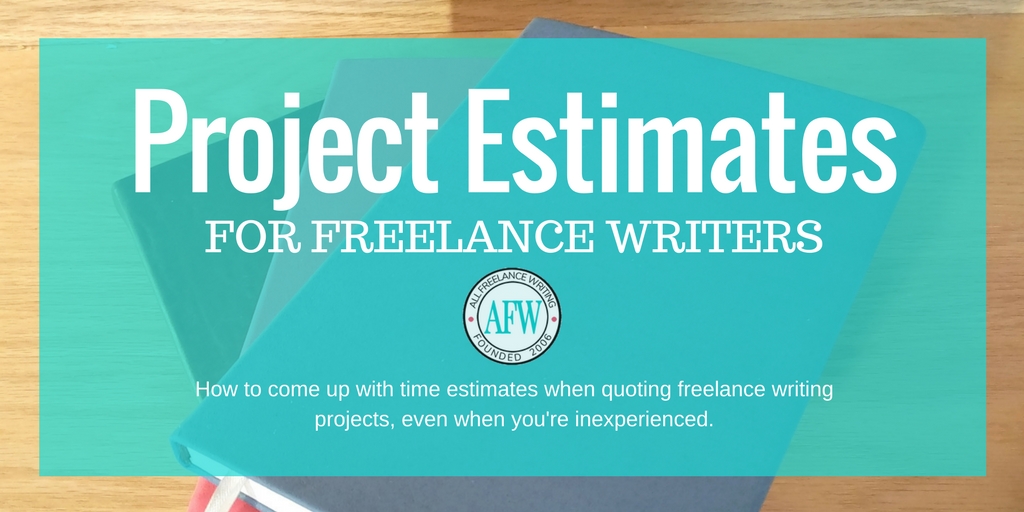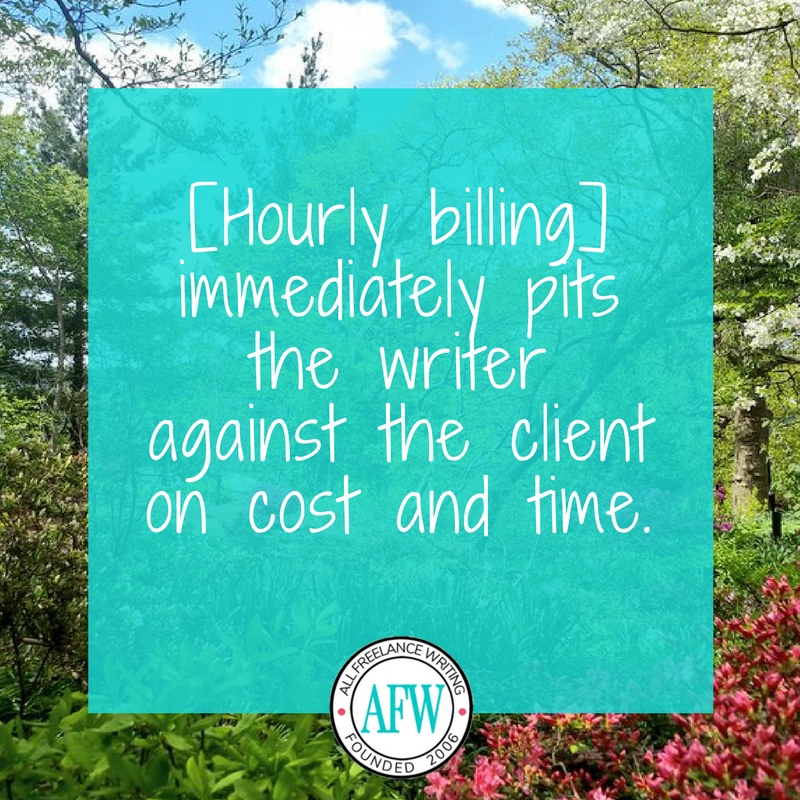
A lot of time has been spent on this blog talking about the basics of setting your freelance writing rates -- figuring out how much you need to earn, figuring out how much that means you need to charge per hour, converting those hourly rate goals into project rates, etc. But what happens if you're still new to freelancing and you have no idea how long certain project types will (or should) take? How do you come up with time estimates so you can set a price?
That's what reader, Lander Sulser, wanted to know when she submitted this question:
I am kind of jumping into freelance writing head first. I am a stay at home mom... I have some projects I'm helping two businesses out with and have chosen to start with an hourly rate. However, being a beginner, I don't know how many hours things will take exactly. Do you have any guidance on how much to charge for writing a product page, about page, caption-writing, and media kit?
Here's what I told Lander. If you're a new freelance writer as well, hopefully it will help you too.
This is a tough question. Unfortunately there’s no standard length of time for any project. It depends on the writer, but also on the project specs.
For example, some product pages are just a paragraph or two of promotional copy along with technical specs, and others can be all-out sales pages with hundreds of words of copy. Similar for an About page. And media kits vary even more widely because they don’t all contain the same material.
Ultimately you want to figure out these things:
- How much you need to earn, and therefore charge per billable hour (I have a calculator you can use to figure this out – there’s an advanced mode as well if you click the link at the top of the tool);
- How much time it takes you to write on average (per-page, per-500-words, or something like that);
You can figure out the latter either based on past projects (if you’ve done any for clients yet, in school, for your own business, etc.). If you haven’t done any samples yet, create some for your own business. It’ll give you practice. They’ll help you market while doubling as examples of your work. And they’ll help you set your rates more realistically up front so you don’t run into trouble later.
Once you know those two things, it’s a simple matter of getting the project details from the client. If they want 10 pages of copy for a media kit, and you know it takes you 2 hours per page, and you need to charge $75 per billable hour, your project quote would be $1500 for the copywriting for that media kit.
Over time, you’ll get a better feel for your average, and you can set more standard project rates. It’s not a perfect system because if you take longer than expected you’ll earn less per hour. But it also means as you get more experienced, and therefore faster, you’ll earn the same per-project fee while putting in fewer hours. It’s a nice way to build a natural “raise” of sorts without having to convince clients to pay you more out-of-pocket quite so often.
One issue you might run into is that, when new, you might write much slower than colleagues in your specialty area. There’s no way to know that up front without asking them directly. I’ve not come across that kind of data beyond blogging, and I’ve found those surveys don’t even come close to representing the time it takes me personally.
So what I suggest is, after calculating what you think you should charge, look up some colleagues who advertise their rates (ideally those with similar specialties and experience levels). If your calculated rates as a new freelancer are higher than what’s already on offer, you might need to adjust downwards, and it’ll be a good sign you need to focus on speeding up your process if you want to hit your target income with your target number of billable hours.
I know that’s a lot to take in. But start by choosing the project types you want to pursue the most. Write a few, even if they’re just mock pieces for practice. That’ll give you an idea of where your own speed lies and where you need to keep rates as a result.

I should also add that I do not recommend hourly billing for freelance writing services. It immediately pits the writer against the client on cost and time -- where the writer wants adequate time and pay, and the client can push to rush a job to keep costs down. If you insist on hourly billing, quote a minimum number of hours for that project so there's a base rate established, and make sure your contract includes an upper limit at which point you'll get client approval to spend extra time. This protects both you and your client, and it forces you to quote as accurately as possible (which you'll get better at with more experience).
I've found project rates make much more sense with writing (in most cases -- there are exceptions with certain specialized type of copy where other rate structures can be more lucrative). So start by calculating your hourly target rate, then convert that to a project rate (or rate per-page, or per-500 words, or something similar) once you've gotten a bit of practice under your belt and know your average speed for different project types.
Do you have a freelance writing question you'd like to see answered on the blog? Submit your reader question today.

Great post. You are correct. You can measure the amount of time you’ll spend on a client’s project, by gauging the amount of time you spend preparing your own content.